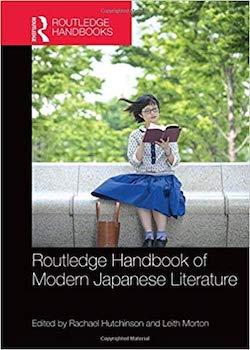The Routledge Handbook of Modern Japanese Literature

Edited by Rachael Hutchinson and Leith Douglas Morton
Routledge, 2016
ISBN: 978-1138792296
Review by Alice French
As a student of modern Japanese literature, it is seldom that I have anything affectionate to say about literary handbooks. I invariably associate them with essay crises and revision, and so was very surprised to find myself picking up the new Routledge Handbook of Modern Japanese Literature to read for pleasure. The conveniently short chapters make it very easy to dip in and out of, and the eclectic mixture of themes and writers covered means that there really is something to please everyone. From Tanizaki to Twitter novels and feminism to Marxism, this handbook skilfully conveys the extensive scope of modern Japanese literature, in only 341 pages.
The Routledge Handbook is particularly refreshing because it does not tackle Japanese literature from an exclusively chronological perspective. Instead, the essays are grouped thematically, creating sections on space and time, gender and sexuality, identity, technology and several others. The first chapter, Stephen Dodd’s Space and Time in Modern Japanese Literature, sets the stage perfectly for what is to follow, taking the reader back to the Meiji period and Nagai Kafu’s 1909 work The River Sumida to explain Japanese literature’s unique relationship with the concepts of time and space, rooted in the “particularly problematic” notion of the Japanese “home.” Chapter two, Jon Holt’s essay on modern haiku and tanka, complements Dodd’s ideas well by exploring “the Japanese sensitivity to time” in poetry. Along with Freedman’s chapter on Kawabata Yasunari and Seaman’s discussion of isolation in women’s literature, the handbook succeeds in providing an effective overview of some of the fundamentals of modern Japanese literature.
However, the book does not dwell for too long on these, and its true merit lies in its focus on the less talked about themes in contemporary Japanese literature. Section two, for example, covers gender and sexuality, with J. Keith Vincent offering a detailed insight into queer reading in Japanese literature and both Hartley and Hutchinson providing interesting takes on Japanese feminism. In fact, the Routledge Handbook as a whole really gives female writers the exposure they deserve, but are often deprived of, with Angela Liu celebrating the work of Mizumura Minae, Kendall Heitzman musing on the rise of women writers, and Jonathan E. Abel giving a nod to the “empress of the cell phone novel,” Naito Mika. As Rachael Hutchinson and Leith Morton aptly argue in their introduction, it is this inclusion of significant sections on queer and female fiction that differentiates this handbook from its predecessors and makes it truly up-to-date.
This is not to say that this handbook is only useful when researching contemporary literature; it also includes comprehensive sections on the works of early 20th century writers and pre- and post-war fiction. I found Chapter Nineteen, The Akutagawa/Tanizaki debate: actors in bundan discourse, especially helpful when writing an essay on Tanizaki’s naturalism last term. Section Four, which focuses on writing war memory, also acts as a useful, interesting and tactful summary of the effect of World War Two on Japan’s literature, but does not dominate the book, avoiding the temptation of defining contemporary fiction purely as a response to the war. The final section instead focuses on Japan’s crowning achievement of the post-war period: its technology. Hansen, Saito and Abel provide fascinating perspectives on everything from cell phone novels to Twitterature, bringing the reader’s journey into modern Japanese literature right up to the present day.
Overall therefore, perhaps disappointingly, I haven’t got one bad word to say against the Routledge Handbook of Modern Japanese Literature. It is well-organised, well-written and, above all, not boring. I could not ask any more of a literary handbook, and can therefore see myself forming a firm friendship with this one as I persevere with my studies of Japanese literature.

